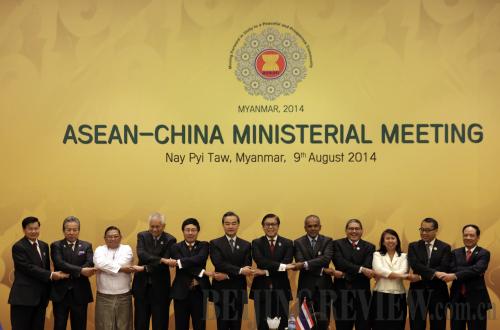|
 |
|
CLOSE BOND: Chinese Foreign Minister Wang Yi (sixth left) takes a group picture with his ASEAN counterparts after the China-ASEAN (10+1) Foreign Ministers' Meeting on August 9 in Nay Pyi Taw, Myanmar (XINHUA) |
On August 8-10, the 47th ASEAN (Association of Southeast Asian Nations) Foreign Ministers Meeting (AMM) and its related gatherings brought together top diplomats from 27 nations, including 10 ASEAN member states and their Dialogue Partner countries, in Nay Pyi Taw, capital of Myanmar, to discuss political, security and development issues that have significant relevance in the region.
However, U.S. Secretary of State John Kerry stole the spotlight with a premeditated collision with China over the South China Sea issue.
Kerry, who was in Nay Pyi Taw to attend the ASEAN Regional Forum, suggested on August 9 that all claimants "freeze" provocative actions in the South China Sea. Meanwhile, a delegation of the Philippines also proposed a three-phase plan during the forum. Both of their suggestions have identified China as the specific objective, aiming to apply diplomatic pressure in the multilateral meeting.
In response, Chinese Foreign Minister Wang Yi, who was also in Nay Pyi Taw, said at a press conference after the China-ASEAN (10+1) Foreign Ministers' Meeting on August 9 that China supports and advocates a "dual-track" approach to resolving the South China Sea issue, marking the first clear statement regarding the issue by the Chinese Government.
China's dual-track approach is an apparent setback to the United States and the Philippines. The final joint statement of the AMM did not include the U.S. and Philippine call for a freeze.
Dual-track details
Wang expounded on the rationale behind China's initiative of the dual-track approach. Firstly, relevant disputes should be addressed by countries directly concerned through friendly consultations and negotiations in a peaceful way. Secondly, peace and stability in the South China Sea concerns the real interests of all littoral countries in the region, including China and ASEAN members, which should be jointly maintained by both China and ASEAN countries.
Wang said that China and ASEAN have identified a solution to the South China Sea issue. According to him, China advocates the dual-track approach because holding talks between countries directly concerned is the most effective and feasible way to settle the issue, in addition to being in line with international law and international conventions. Moreover, the approach is also one of the most important provisions of the Declaration on the Code of Conduct on the South China Sea (DOC), which was reached by China and all ASEAN member states on November 4, 2002 in Phnom Penh, Cambodia.
Jiang Zhida, an associate research fellow of the Beijing-based China Institute of International Studies, told Beijing Review that the dual-track approach aligns with China's previous policy stance on the issue.
Foreign Minister Wang's speech shows China's strong determination to safeguard the national sovereignty and territory in the South China Sea as well as its positive approach to solving the issue through negotiations, Jiang said. He pointed out that the approach stresses the responsibility and obligation of both China and relevant countries to maintain regional peace and stability.
In view of the fact that the U.S. "freeze" proposal was rejected by most nations during the meeting, "the dual-track approach is a successful implementation of the new Asian security concept that China has always advocated, according to Jiang. "The dual-track approach conforms to common interests of both China and all other riparian states in the South China Sea, including ASEAN countries. Any outsider country should not complicate the issue by intervening," Jiang said.
Le Luong Minh, ASEAN Secretary General, said on August 9 that ASEAN foreign ministers did not discuss the U.S. suggestion because there is already an established mechanism for resolving the South China Sea issue—the DOC— in which the parties agree to exercise self-restraint in the conduct of activities that would complicate or escalate disputes and affect peace and stability.
Wang also stressed that past experience over the years has proved that as long as parties concerned remain committed to the dual-track approach and encourage positive interactions between efforts along the two tracks, China and ASEAN countries are capable of effectively managing and properly handling specific disputes and maintaining overall peace, stability and cooperation in the region.
Hidden U.S. motives
Kerry was not the first senior U.S. official to suggest a freeze of actions in the South China Sea. Daniel R. Russel, U.S. Assistant Secretary of State for East Asian and Pacific Affairs, put forward such a proposal publicly earlier in July.
"The U.S. proposal sounds fair but it cannot cover its deceptive and hypocritical purposes," Jia Xiudong, a senior researcher with the China Institute of International Studies, said to People's Daily.
At its core, the U.S. proposal aims to help some Southeast Asian countries legitimize the occupation of China's territories in the South China Sea and give the United States an opportunity to play an arbitrator role in resolving the issue, Jia said.
| 